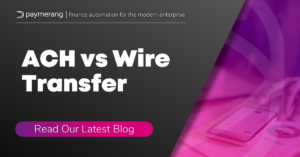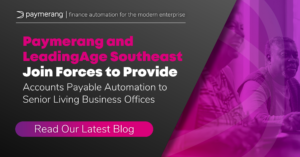The Time to Automate Your Healthcare Accounts Payable is Now
Automating Accounts Payable (AP) in the healthcare industry has quickly gone from a nice-to-have option to a necessity.
According to the U.S. Bureau of Labor Statistics, a record-breaking 47.8 million workers quit their job in 20211. The Great Resignation and employee burnout, both triggered by the pandemic, created severe staffing shortages in the healthcare field that expanded to back-office operations.
Severe turnover exacerbated AP departments’ challenges, but that’s not to say manual processing was perfect beforehand. Slow processing times, printing checks, stuffing envelopes, chasing invoice approvals, manual payment reconciliation, and human error are all frustrations AP staff endure daily.
Doctors and nurses use advanced technology to deliver optimal patient care on the frontline, but data shows that business offices are hesitant to do the same. For example, 70% of supplier invoices are sent via mail or email, and 50% of healthcare organizations pay their suppliers with a check2. Manual processing often results in payment delays, which strains relationships with vendors.
While Paymerang’s best-in-class finance automation improves compliance, simplifies workflows, and vendor payments, AP leaders are slow to switch to an electronic payment system for different reasons. Pushback includes:
Financial limitations:
Paymerang’s cloud-based solution is a cost-effective option for organizations because it requires no software license, no expensive hardware for installation, and no annual maintenance. Moreover, manual paper-based processing could hurt accounting departments more than they realize. In the healthcare industry, manual processing causes significant financial losses resulting in $22 billion in unnecessary expenses3 and adding to that, errors resulting from manual cost the industry between $4 million and $6 million annually4.
A fear of eliminated positions:
AP leaders fear that finance automation will eliminate employees’ positions, but the reality is that AP teams are already suffering from staffing shortages and heavy turnover. Instead of eliminating positions, Paymerang’s automation solution provides employees with digital tools that make it easier for them to do their jobs. In return, AP departments can recruit and retain top talent.
Implementing new technologies:
Many healthcare AP departments don’t switch to electronic payment methods simply because implementing new technologies can be a pain. However, Paymerang makes implementation quick and easy, and new clients can be up and running in 10 hours or less. Additionally, Paymerang seamlessly integrates into a range of Enterprise Resource Planning (ERP) platforms.
The benefits of switching to a holistic financial automation solution outweighs all these concerns. Firstly, Paymerang streamlines the accounting process and eliminates the manual tasks that overburden AP staff, saving them thousands of hours each year. Doing so allows staff to focus on strategic initiatives that produce better patient care. Paymerang also provides enhanced fraud protection, business continuity, compliance, and reduced check fraud and escheatment for the healthcare space.
Paymerang also offers Invoice Automation technology that uses artificial intelligence to capture, read and route invoices, giving your team a fail-safe electronic paper trail. This feature is HIPAA-compliant and has features in place to secure and protect patient information.
Lastly, Paymerang values white-glove customer service, which distinguishes it from banks and other programs. More than 100 U.S.-based customer representatives can answer inquiries from vendors and AP teams, typically within two hours or less, guaranteeing that an organization’s AP staff isn’t left to deal with tasks that slow them down.
Healthcare AP staff have dealt with unforeseen challenges in the past few years, and many are still dealing with the aftermath. Finance automation, which once was an afterthought for many departments, is now a necessary part of a well-functioning department.
To learn more, click here.
1U.S. Bureau of Labor Statistics
2 “Payables automation for Healthcare,” PayStream Advisors, 2018
3 The Cost of Paper Records on Both Sides of the Healthcare Supply Chain Is Daunting,” Remitra 2021
4 Tech Enabled and Paper Free Bringing Healthcare Purchasing into the 21st Century,” Remitra, 2021




